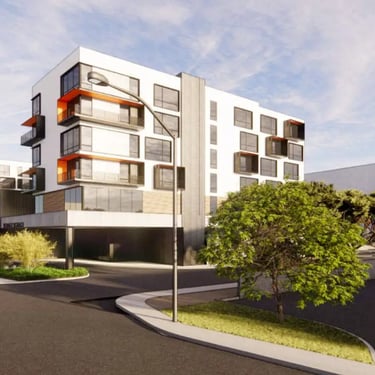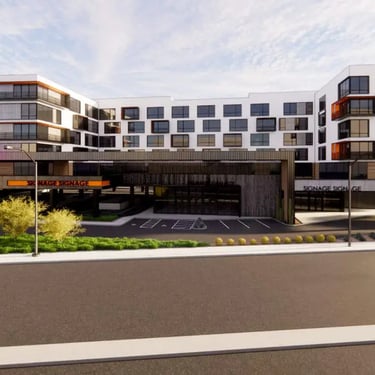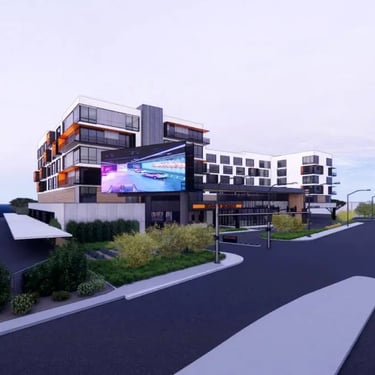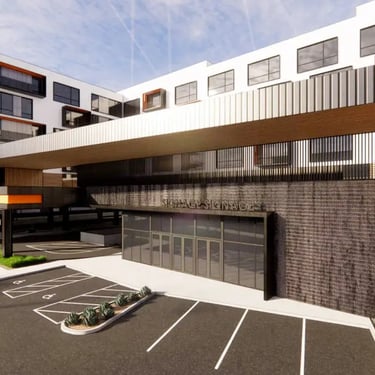Vegas Loop Apartment Plan Advances — Could Nashville Be Next?
Clark County just greenlit a 132-unit apartment complex built directly on the Vegas Loop, cutting parking by nearly 90%. With much of Murfreesboro Pike underutilized, Metro leaders have a chance to do the same here — bringing new housing, lower costs, and a stronger transit future to Music City. [Read more ➝]
By the LOOP Nashville Editorial Staff
8/28/20252 min read
By the LOOP Nashville Editorial Staff
Clark County, Nevada, has approved a six-story, 132-unit apartment complex directly connected to the Vegas Loop, the underground transportation system developed by The Boring Company.
The Loop Apartments will feature amenities such as a pool, fitness center, co-working space, and ground-floor retail, but far fewer parking spaces than a traditional project. Thanks to an integrated Loop station, county planners allowed an 87 percent reduction in required parking — a dramatic shift in how cities pair housing with transit.
“It’s a totally new way of thinking about urban housing,” said Commissioner Jim Gibson, who noted that much of Las Vegas is already “over-parked.”
Nashville’s Opportunity: Murfreesboro Pike
In Nashville, the conversation is quickly turning to where similar development might take hold. The Music City Loop, announced earlier this summer, will connect Nashville International Airport to downtown with stops along key corridors, including Murfreesboro Pike.
Today, much of Murfreesboro Pike remains underutilized. Despite being one of the city’s busiest commuter routes, the corridor is dotted with vacant lots, aging strip malls, and low-density development. Transit-integrated housing could transform the area into a thriving residential and commercial spine, bringing thousands of new units to market while reducing traffic pressure on already-crowded surface streets.
“Linking Murfreesboro Pike to the Loop is exactly the kind of catalyst project Nashville needs,” one local housing advocate said. “It would finally unlock land that’s been sitting stagnant and give people a real alternative to driving everywhere.”
Tackling Housing Costs with Supply
Nashville’s housing costs have climbed steadily as population growth has outpaced supply. By pairing Loop stations with new multifamily construction, developers could deliver higher density housing without the usual parking mandates that drive up costs.
A transit-first apartment model, similar to the Vegas development, could shave millions off construction budgets by reducing the need for expensive parking decks. Those savings could be passed along to renters or used to build more units — expanding supply at a time when Nashville desperately needs it.
Public–Private Partnerships
The Las Vegas project is backed by private developers working hand-in-hand with The Boring Company. In Nashville, a similar approach could be forged between The Boring Company, local builders, and Metro Government. Incentives like density bonuses, expedited approvals, or property tax abatements could encourage Loop-oriented housing along Murfreesboro Pike and other corridors.
Looking Ahead
Las Vegas is showing what happens when transit and housing are integrated from the ground up. For Nashville, the underdeveloped Murfreesboro Pike corridor may be the perfect proving ground. If paired with the Music City Loop, it could deliver both mobility and affordability — a blueprint for the city’s next phase of growth.
But for that to happen, Metro Government will need to step up. Local leaders must re-examine parking mandates, update zoning, and create incentives that make Loop-integrated housing not just possible, but practical. Just as importantly, they must embrace the positives the Loop has to offer and not allow partisan politics to stand in the way of The Boring Company delivering a high-quality public transportation system to Music City.
With construction of the Music City Loop slated to finish as early as 2026, the window for action is open now — and closing fast.




Disclaimer
LOOP Nashville aggregates publicly available news, commentary, and editorial content related to the Music City LOOP project. All source material is fully credited and attributed to its original publishers. All commentary and editorial opinions are solely those of the LOOP Nashville Editorial Staff. We are an independent site and are not affiliated with The Boring Company or the Music City LOOP project.
CONTACT
Follow
scoop@loopnashville.com
© 2025. All rights reserved.
